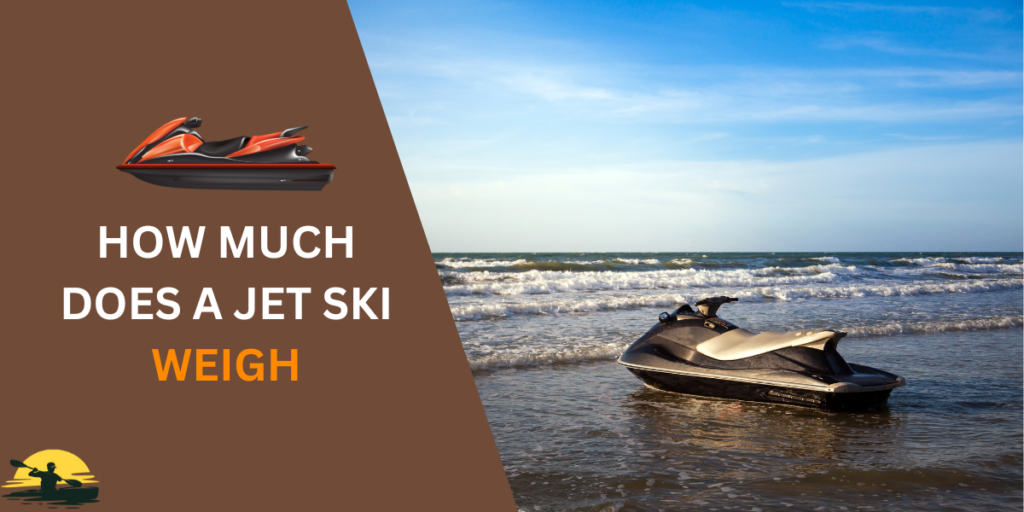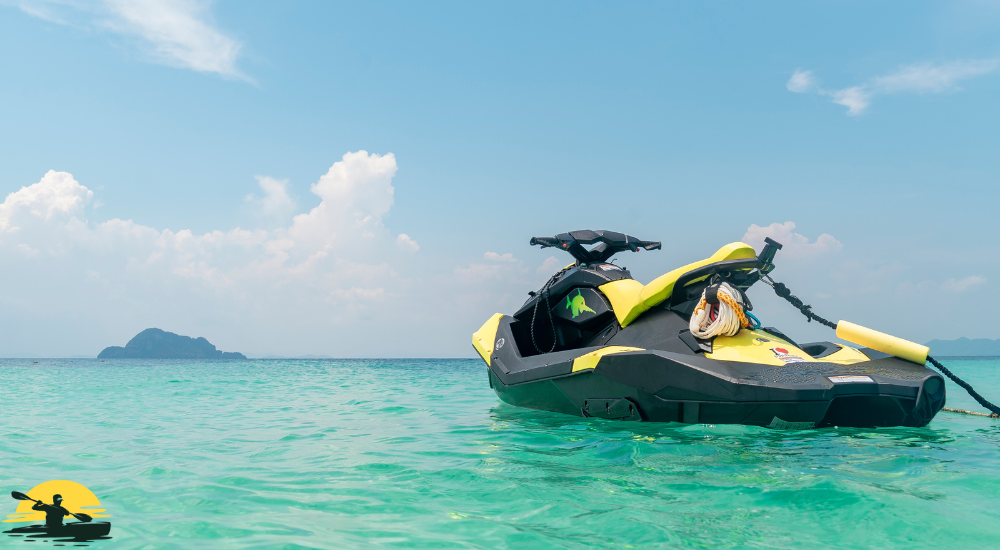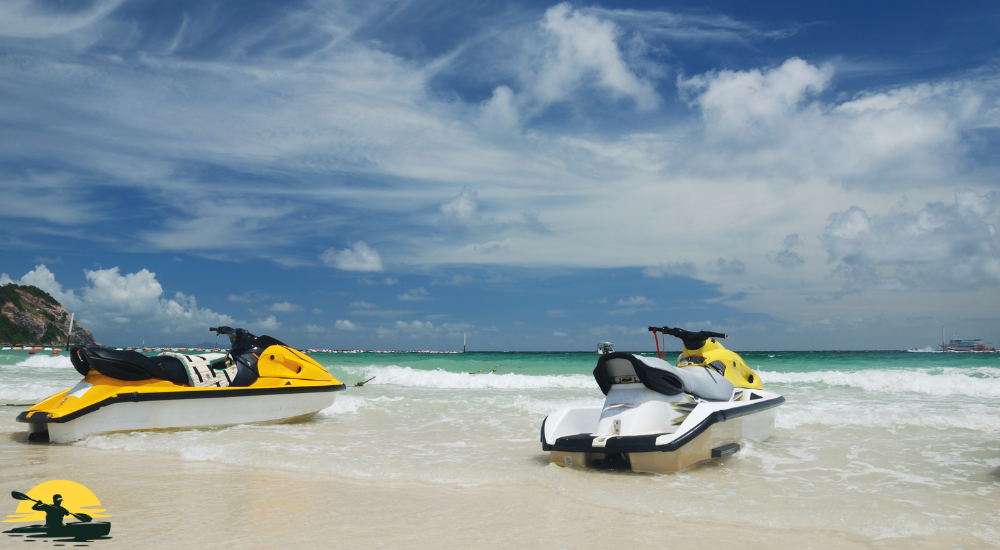
Have you ever wondered how much those jet skis weigh?
It’s a big deal when you’re trying to haul one on a trailer. Different jet skis weigh different amounts – a Sea-Doo Spark isn’t the same as a big fancy one.
Even how much fuel or oil is inside can change the weight.
This guide will show you the weight of different jet skis and how knowing your jet ski’s weight can help you choose the right trailer and stay safe on the road.
Jet Ski Weight
- Jet skis can weigh anywhere from 400 lbs. to over 1,200 lbs.
- The average dry weight of a jet ski is around 700 lbs.
- Knowing your jet ski’s weight is crucial for safe trailering and choosing the right tow vehicle.
- Dry weight refers to the weight of the jet ski without fuel, oil, or gear.
- Wet weight includes fuel, oil, and typical riding gear.
- Find your jet ski’s weight in the owner’s manual, online, or by asking a dealer.
- Factor in fuel, oil, gear, and rider weight for the total weight you’ll be towing.
- Distribute weight evenly on the trailer and pack light for safe trailering.
What Influences Jet Ski Weight?
So, what makes one jet ski heavier than another?
Let’s break it down…

- The Jet Ski Model: This is a big one. Some jet skis, like those in the Sea-Doo Spark series, are built for fun and are pretty light. Others are like race cars of the water, with bigger engines and fancier stuff, so they weigh more.
- How Much Gas is in the Tank: Think about your car – it’s heavier with a full tank, right? The same goes for jet skis. A full tank of gas can add a lot of weight.
- Oil Level: Oil isn’t as heavy as gas, but it still adds a bit to the total weight.
- Extra Stuff You Add: Just like you pack a cooler and towels for a beach day, people add things to their jet skis. Speakers, storage bins, or even a tow rope all add up.
- Who’s Riding and What They Bring: Don’t forget about the people! The weight of the riders and any gear they bring along counts towards the jet ski’s total weight.
Knowing this weight helps you pick a trailer and stay safe. “Dry weight” is the jet ski without extras; “total weight” is everything loaded up.
Jet Ski Weights by Category
Now let’s dive into the actual weights of different types of jet skis:
- Small, Fun Jet Skis: These are made for cruising and playing around, so they’re the lightest. Think of the Sea-Doo Spark. They usually weigh around 400-500 pounds dry.
- Speedy Jet Skis: These are for folks who want to go fast! They have bigger engines and sometimes even superchargers, so they’re heavier, around 600-800 pounds dry.
- Fancy Jet Skis: These are like the luxury cars of the water, with comfy seats and lots of cool features. All those extras make them weigh more, often around 800-1000 pounds dry.
- Stand-Up Jet Skis: These are for the daredevils who like to ride standing up. Since they’re simpler and don’t have seats, they’re the lightest of all, typically under 400 pounds dry.

Remember, these are just the dry weights.
You have to add on the fuel weight (usually about 6 pounds per gallon) and oil weight (a few pounds) to get the curb weight—what it actually weighs before you get on.
Of course, the weight of the people riding and any gear they bring also contributes to the total weight.
There are charts online and in some PWC magazines where you can easily find the average weight for different models if you want to know exactly how much yours weighs.
Dry Weight vs. Wet Weight
Hold on a second!
Before we go any further, we need to talk about two different ways to talk about a jet ski’s weight:
- Dry Weight: This is how much the jet ski weighs all by itself, without any gas, oil, or extra stuff. It’s like weighing yourself before breakfast. Most of the time, when you look up how much a jet ski weighs, this is the number you’ll see.
- Wet Weight (or Curb Weight): This is the weight of the jet ski when it’s ready to ride, with a full tank of gas and oil. It’s like weighing yourself after a big meal. This is the number you really need to know when choosing a trailer and making sure you’re towing safely.
Why does this matter?

Well, most jet ski makers only tell you the dry weight when you’re figuring out what kind of trailer you need.
You have to add on the weight of the gas and oil plus anything else you plan on bringing along. That’s why it’s important to understand the difference between dry weight and wet weight.
How to Find Your Jet Ski’s Weight
So, where do you find this weight information?
Here are some easy places to look:
- The Owner’s Manual: This little book that comes with your jet ski is a goldmine of info. It’ll tell you the dry weight and fuel capacity (how much gas it holds).
- The Internet: Most personal watercraft (PWC) makers have websites with specs for all their models. You can also find information on sites that discuss jet skis or boating.
- The Jet Ski Dealer: If you need help finding the info, ask the people who sell them! They’ll know all about the different weights and can even help you find the right trailer.
- Weigh It Yourself: If you really want to know exactly how much your jet ski weighs, you can take it to a place with a big scale. This is the most accurate way, but it can be a bit of a hassle.
No matter how you find it, knowing the weight of your jet ski is super important.
It helps you choose the right trailer, tow it safely, and even know how it will handle the water. So, take this step!
Why Jet Ski Weight Matters
Knowing your jet ski’s weight isn’t just about showing off to your friends. It’s really important for a few reasons:

- Picking the Right Trailer: This is like choosing the right size bike for you. You wouldn’t want a tiny motorcycle if you’re really tall. The same goes for trailers. They have a “load capacity”—how much weight they can safely carry. You need to make sure your trailer can handle the weight of your jet ski, the gas, and everything else. Trailers themselves can weigh a couple hundred pounds, too, so don’t forget that.
- Towing it Safely: You don’t want your jet ski flying off the trailer on the way to the lake! Knowing the total weight helps you make sure your car or truck has enough “towing capacity” to pull the trailer without any problems.
- Storing Your Jet Ski: Some jet ski lifts or storage racks have weight limits, so you need to make sure yours can handle it.
- Riding the Waves: Even how well your jet ski rides can change depending on how much weight is on it. Some jet skis, like the Sea-Doo RXT or RXP models, are made to handle more weight. Others, like the Sea-Doo GTI or Spark, might be better for lighter loads.
So, before you hit the water, do your homework and make sure you know how much your jet ski weighs!
Tips for Managing Jet Ski Weight
Alright, so you know the weight of your jet ski. Now what?
Here are some tips for keeping things safe and easy:
- Balance is Key: When you load your jet ski onto the trailer, make sure the weight is even on both sides. You don’t want it leaning to one side or the other – that’s dangerous!
- Pack Light: Only bring what you really need for your day on the water. Extra stuff adds weight and makes your trailer harder to pull.
- Watch the Gas: A full tank of gas adds weight, so if you’re going a short distance, you might only need to fill it some of the way up. This can make a difference, especially if you’re close to your trailer weights limit.
Remember, a little planning goes a long way. By keeping these tips in mind, you’ll be able to enjoy your jet ski without any worries.
Conclusion

There you have it! We’ve covered why jet ski weight matters, the things that affect it, andhow to find out the actual weight of your own PWC.
Remember, it’s not just a number—it’s about picking the right trailer, staying safe while towing, and even having more fun on the water.
So, before you hook up your jet ski and head out for a day of fun, double-check that weight. It’s a small thing that can make a big difference!
Frequently Asked Questions
What is the average weight of a jet ski?
The average jet ski weighs 400 to 1,200 pounds or more. Smaller “rec lite” models like the Sea-Doo Spark are on the lighter end, while performance models like the Kawasaki Ultra 310 are much heavier.
What is the difference between dry weight and wet weight?
Dry weight is the weight of the jet ski without fuel, oil, or gear. Wet weight includes these, giving you the actual PWC weight you’ll be towing and handling.
How do I know if my trailer can handle my jet ski?
Could you check your trailer’s weight capacity? This is the maximum weight it can safely carry. Calculate the total weight of your jet ski (wet weight), any gear, and the trailer itself. Make sure this total is less than your trailer’s capacity.
Can you tow my jet ski?
Could you check your vehicle’s towing capacity? This is the maximum weight it can safely pull. The combined weight of your jet ski, trailer, gear, and trailer weight should be less than your vehicle’s towing capacity.
What other factors affect jet ski weight?
Besides the model and size of your jet ski, other factors that add weight include:
Fuel in the tank: A full tank can add a significant amount of weight.
Oil: While not as heavy as fuel, it still contributes.
Accessories: Things like speakers, coolers, and tow ropes add up.
Riders and their gear: Don’t forget to include the weight of everyone riding and their belongings.










